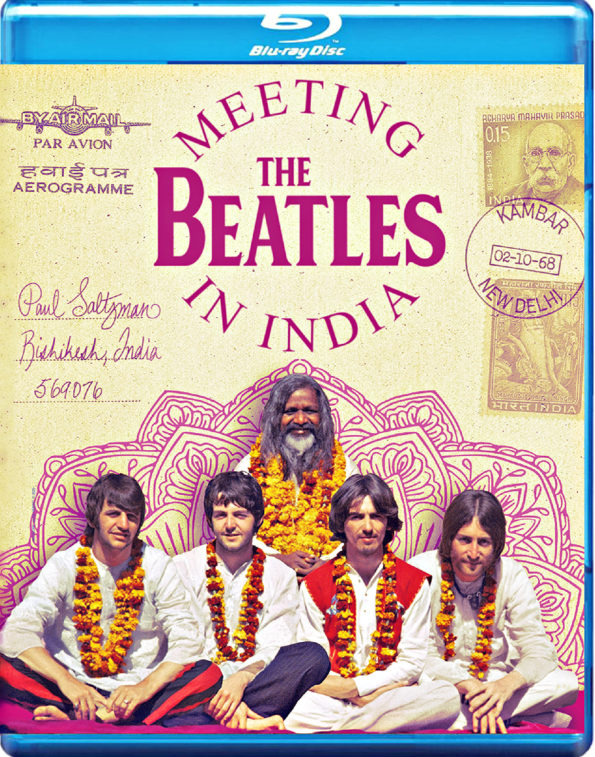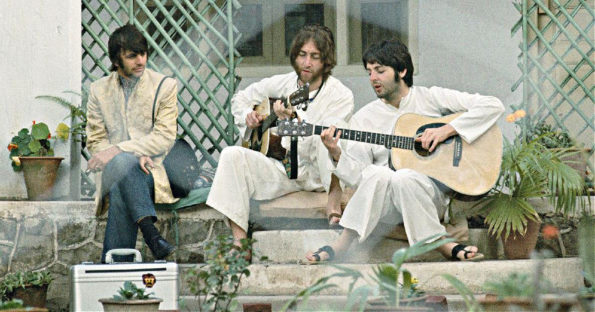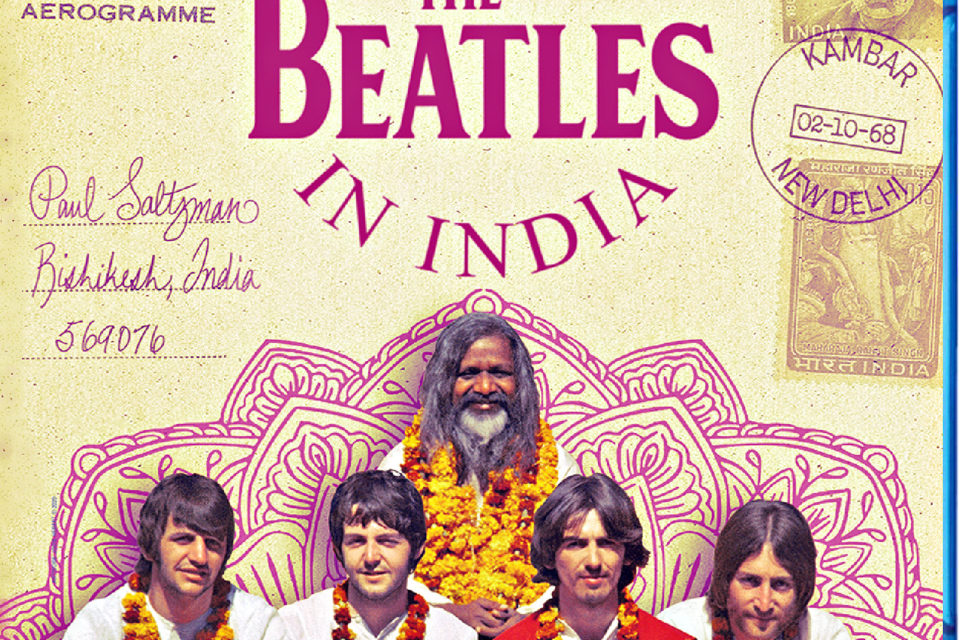It’s not quite the same as the fictional struggling musician Jack Malik in the 2019 film Yesterday suddenly discovering that he’s about the only person on the planet who has any recollection of The Beatles and every note and lyric of their songs, but Canadian Paul Saltzman has had his own stunning moments of Beatles-related discoveries. In fact, he’s had two. Both are related in the 82-minute 2020 documentary Meeting the Beatles in India, now being released on Blu-ray by Unobstructed View ($24.98) with an hour-long bonus feature of deleted and “extra” scenes.
Once inside, he learned it was the same ashram where the Beatles had recently arrived for their own month-long cleansing/re-awakening experience at the height of their popularity. Saltzman was about the only non-entourage participant at the ashram at the time and, as he tells it, quickly became friends and hung out daily with The Beatles since they realized he wasn’t a groupie. He sat with them during meals and watched them working out some of the dozens of songs they wrote during this time (on a return trip to India for this film, Saltzman is shown debating, bordering on uncomfortably, with Beatles expert Mark Lewisohn whether it was 30 songs the expert says there is documentation that The Beatles wrote during this time at the ashram, or 48, as Saltzman insists based on a source he prefers – most ended up on The White Album). Saltzman, whose voice and on-camera appearances dominate the film (Morgan Freeman offers introduction narration and a couple other brief voice-overs), relates a story of listening to Paul and John sitting on steps working out the chorus of a new song to which Paul sings the only lyrics he says they have so far: Ob-la-di, Ob-la-da. He also features comments from George Harrison’s ex-wife Pattie Boyd and her sister Jenny, among others, and tracked down the man who became the subject of The Beatles song The Continuing Story of Bungalow Bill.
The second Beatles discovery moment for Saltzman was decades later when his daughter Devyani Saltzman asked her broadcaster/filmmaker father about the photos he had mentioned over the years that he took of The Beatles while at the ashram, which he says he had forgotten about. These approximately 40 photos – the most famous of which is on the cover of the Blu-ray (they appear to have been taken initially as slides), are terrific and amazing, given the historical context and significance, and they are the highlight of the movie, which also features comments by filmmaker and meditation proponent David Lynch, and some very relatable exchanges between Saltzman and his rather jaded daughter Devyani.

The film, which feels like Saltzman mostly tracing his steps back to a special and memorable time in his life, and at times is a little fawning and self-aggrandizing, is sprinkled with rare and never-before seen photos and film footage. Unfortunately, as an unofficial production, the lack of Beatles music playing even briefly is missed as so many songs are mentioned.

Although the primary 82-minute film already feels a little drawn-out and thin compared to most documentaries – more like the personal remembrance and effort to relive a life experience that it is – the hour of extra scenes are not just more of the same, but offer some interesting background, some more anecdotes, and deep dives into meditation. During the first ten minutes we get a behind-the-scenes look at the process of artist Mike Vosburg in producing the impressive and fun graphic novel-type illustrations used to create visual imagery to match Saltzman’s stories during main film, as well as during several additional brief stories in the first 10-minutes of the extras section, one involving Beatles friends at the ashram Mia Farrow and the Prudence of The Beatles Dear Prudence song (lyrics he notes were derived from Beatles trying to get her to come out from her hut and interact with them).
The bonus hour ends with Chor Bazaar, a Mumbai pop culture shop owner, showing his Beatles memorabilia, including a ticket to a Beatles concert.
Other segments of this extra program include interviews in North America and during Saltzman’s return to India:
- David Lynch (8-min), the filmmaker discusses his ongoing relationship with The Beatles through their support of his David Lynch Foundation to ensure that any child in America who wants to learn and practice the Transcendental Meditation program can do so.
- Steve Hasenberg, psychotherapist, meditation teacher (more than 15 mins)
- Erwin Pearlman, spiritual guide (5-min), provides context of how The Beatles introduced meditation and spirituality to the general public in their practices and through their music.
- Swami Chidanand Sawaswati, president Parmarth Niketan in Rishikesh India (5-min) on yoga and meditation helping people become receptive to spirituality.
- Swami Bhagawati Sawaswati, president Divine Shakti Foundation (2-min) on The Beatles providing something young people could embrace at time when there was so much in the world to turn away from.
- Heidi Walk, psychotherapist, meditation teacher (90-sec) on her initial awakening and state of ecstasy, joy and peace that created a world of love for her along with the songs of The Beatles that helped her through her teen years.
- Sheva Carr, director HeartMath, CEO Heart Ambassadors, and Robert Browning, director HeartMath Healthcare (6-min) on how the unique and new sound and style of The Beatles opened the world to the concept of All You Need is Love, and how important their influence was on the introduction of mediation to millions, all of which they say has a direct physical beneficial connection that can be tracked via modern neuro-science and neuro-cardiology (the heart of the brain).
